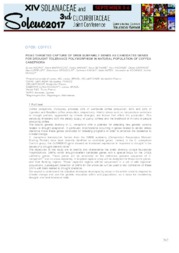Targeted capture of Dreb subfamily genes as candidates genes for drought tolerance polymorphism in natural population of Coffea canephora.
Targeted capture of Dreb subfamily genes as candidates genes for drought tolerance polymorphism in natural population of Coffea canephora.
Author(s): AQUINO, S.; MARRACCINI, P.; MARIAC, C.; BETHUNE, K.; ANDRADE, A. C.; DARRACQ, O.; LEPELLEY, M.; KIWUKA, C.; ANTEN, N.
Summary: Coffea canephora, (Robusta), provides 33% of worldwide coffee production, 80% and 22% of Ugandan and Brazilian coffee production, respectively. Abiotic stress such as temperature variations or drought periods, aggravated by climate changes, are factors that affect this production. This sensitivity threatens both the steady supply of quality coffees and the livelihood of millions of people producing coffee. The natural genetic diversity of C. canephora offer a potential for detecting new genetic variants related to drought adaptation. In particular, modifications occurring in genes related to abiotic stress tolerance make these genes candidate for breeding programs in order to enhance the resilience to climate change.
Publication year: 2017
Types of publication: Abstract in annals or event proceedings
Unit: Embrapa Coffee
Observation
Some of Embrapa's publications are published as ePub files. To read them, use or download one of the following free software options to your computer or mobile device. Android: Google Play Books; IOS: iBooks; Windows and Linux: Calibre.
Access other publications
Access the Agricultural Research Database (BDPA) to consult Embrapa's full library collection and records.
Visit Embrapa Bookstore to purchase books and other publications sold by Embrapa.

